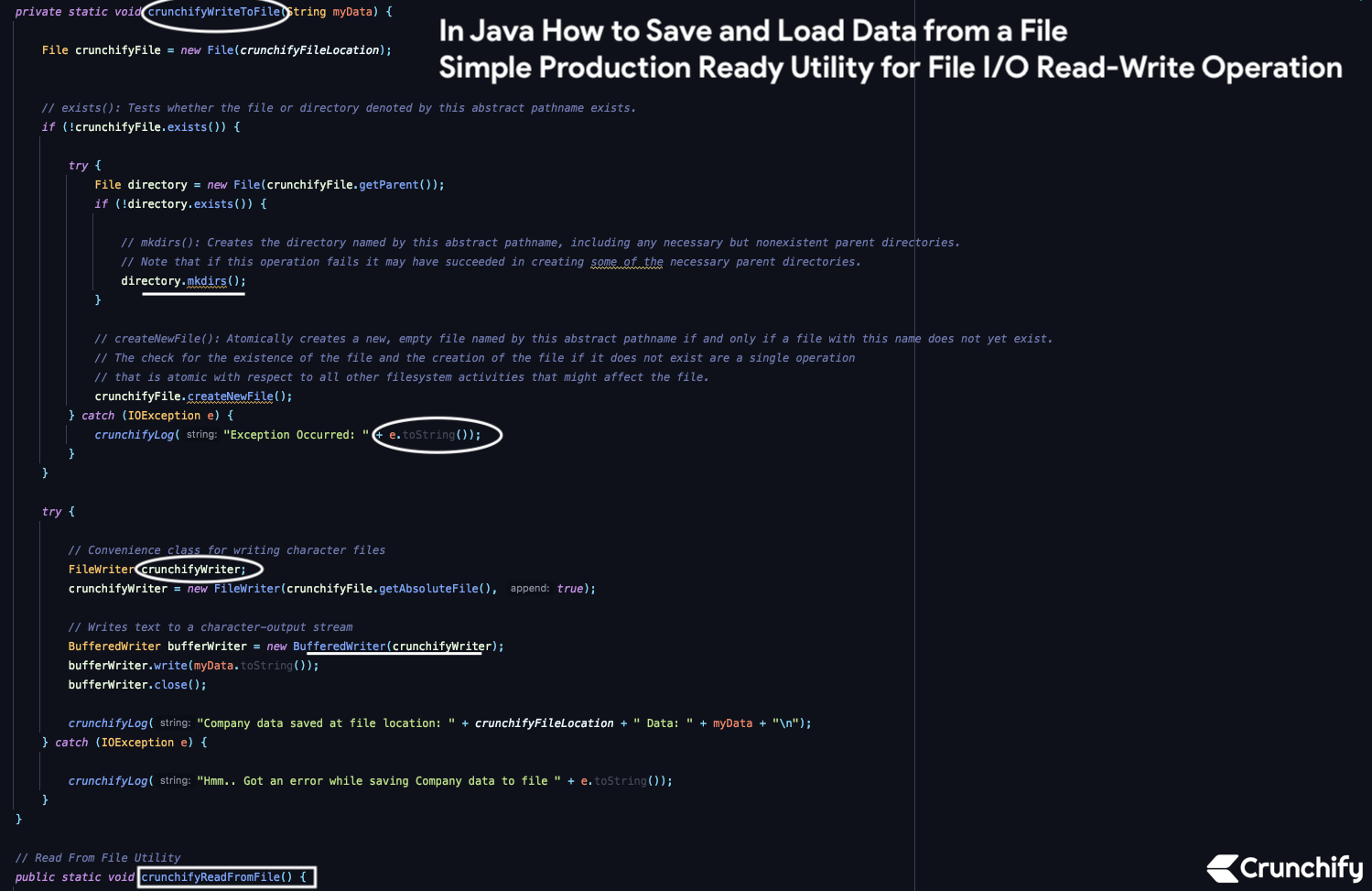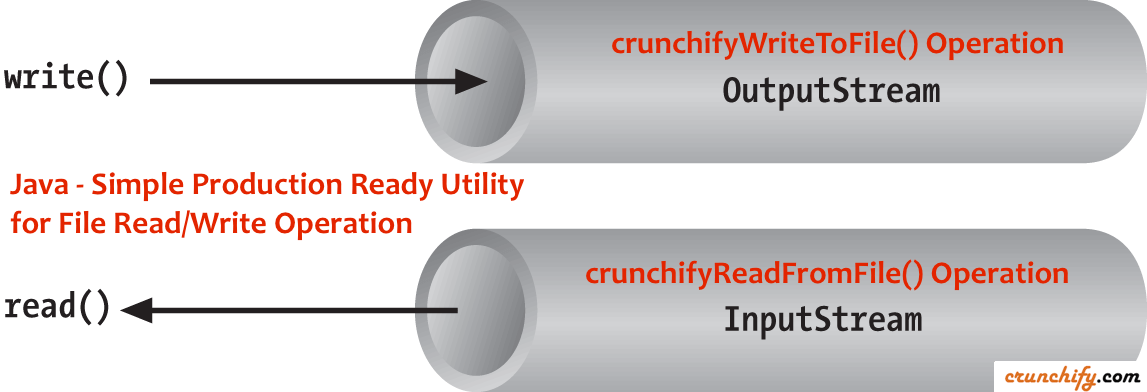In Java So speichern und laden Sie Daten aus einer Datei – Einfaches, produktionsbereites Dienstprogramm für Datei-E/A-Lese-/Schreibvorgänge
Veröffentlicht: 2020-10-11
Wie schreibe ich ein Objekt in eine Datei und lese es zurück?
Java ist ziemlich erstaunlich mit vielen APIs und mit Java 8 sind wir mit viel mehr APIs wie Lambda, Methodenreferenz, Standardmethoden, besserer Typschnittstelle, sich wiederholenden Anmerkungen, Methodenparameterreflexionen und vielem mehr voll ausgestattet.
Vor einiger Zeit habe ich einen Artikel über das Lesen von JSON-Objekten aus Dateien in Java geschrieben. Es war eine einfache Java-Leseoperation. Aber in diesem Tutorial werden wir Daten mit einem einfachen Production Ready Java Utility aus einer Datei save and load .

Wir speichern nicht nur ein einfaches Objekt, sondern erstellen ein einfaches Java-POJO vom Typ CrunchifyCompany und speichern und rufen das Objekt mit GSON . Sie benötigen die folgende Abhängigkeit, damit das folgende Programm ausgeführt werden kann.
Setzen Sie unten die Abhängigkeit zu Ihrem Maven-Projekt. Wenn Sie ein dynamisches Webprojekt haben und es in ein Maven-Projekt konvertieren möchten, befolgen Sie diese Schritte.
|
1 2 3 4 5 |
< dependency > < groupId > com . google . code . gson < / groupId > < artifactId > gson < / artifactId > < version > 2.3 < / version > < / dependency > |
Hier ist ein Ablauf:
- Erstellen Sie die Klasse
CrunchifyReadWriteUtilityForFile.java - Erstellen Sie eine private innere Klasse
CrunchifyCompanymit zwei Feldern- private int
employees; - private
companyName;
- private int
- Objekt
crunchifyinnerhalb der Hauptmethode erstellen - Konvertieren Sie das Objekt in
Gson, damit es in einer Datei gespeichert wird - Verwenden Sie die Methode
crunchifyWriteToFile, um Daten in einer Datei in Java zu speichern - Verwenden Sie die Methode
crunchifyReadFromFile, um Daten aus einer Datei in Java abzurufen
Hier ist ein vollständiges Beispiel:
|
1 2 3 4 5 6 7 8 9 10 11 12 13 14 15 16 17 18 19 20 21 22 23 24 25 26 27 28 29 30 31 32 33 34 35 36 37 38 39 40 41 42 43 44 45 46 47 48 49 50 51 52 53 54 55 56 57 58 59 60 61 62 63 64 65 66 67 68 69 70 71 72 73 74 75 76 77 78 79 80 81 82 83 84 85 86 87 88 89 90 91 92 93 94 95 96 97 98 99 100 101 102 103 104 105 106 107 108 109 110 111 112 113 114 115 116 117 118 119 120 121 122 123 124 125 126 127 128 129 130 131 132 133 134 135 136 137 138 139 |
package crunchify . com . tutorial ; import com . google . gson . Gson ; import com . google . gson . stream . JsonReader ; import java . io . * ; import java . nio . charset . StandardCharsets ; /** * @author Crunchify.com * Best and simple Production ready utility to save/load * (read/write) data from/to file */ public class CrunchifyReadWriteUtilityForFile { private static final String crunchifyFileLocation = "/Users/appshah/Documents/crunchify.txt" ; private static final Gson gson = new Gson ( ) ; // CrunchifyComapny Class with two fields // - Employees // - CompanyName private static class CrunchifyCompany { private int employees ; private String companyName ; public int getEmployees ( ) { return employees ; } public void setEmployees ( int employees ) { this . employees = employees ; } public String getCompanyName ( ) { return companyName ; } public void setCompanyName ( String companyName ) { this . companyName = companyName ; } } // Main Method public static void main ( String [ ] args ) { CrunchifyCompany crunchify = new CrunchifyCompany ( ) ; crunchify . setCompanyName ( "Crunchify.com" ) ; crunchify . setEmployees ( 4 ) ; // Save data to file crunchifyWriteToFile ( gson . toJson ( crunchify ) ) ; // Retrieve data from file crunchifyReadFromFile ( ) ; } // Save to file Utility private static void crunchifyWriteToFile ( String myData ) { File crunchifyFile = new File ( crunchifyFileLocation ) ; // exists(): Tests whether the file or directory denoted by this abstract pathname exists. if ( ! crunchifyFile . exists ( ) ) { try { File directory = new File ( crunchifyFile . getParent ( ) ) ; if ( ! directory . exists ( ) ) { // mkdirs(): Creates the directory named by this abstract pathname, including any necessary but nonexistent parent directories. // Note that if this operation fails it may have succeeded in creating some of the necessary parent directories. directory . mkdirs ( ) ; } // createNewFile(): Atomically creates a new, empty file named by this abstract pathname if and only if a file with this name does not yet exist. // The check for the existence of the file and the creation of the file if it does not exist are a single operation // that is atomic with respect to all other filesystem activities that might affect the file. crunchifyFile . createNewFile ( ) ; } catch ( IOException e ) { crunchifyLog ( "Exception Occurred: " + e . toString ( ) ) ; } } try { // Convenience class for writing character files FileWriter crunchifyWriter ; crunchifyWriter = new FileWriter ( crunchifyFile . getAbsoluteFile ( ) , true ) ; // Writes text to a character-output stream BufferedWriter bufferWriter = new BufferedWriter ( crunchifyWriter ) ; bufferWriter . write ( myData . toString ( ) ) ; bufferWriter . close ( ) ; crunchifyLog ( "Company data saved at file location: " + crunchifyFileLocation + " Data: " + myData + "\n" ) ; } catch ( IOException e ) { crunchifyLog ( "Hmm.. Got an error while saving Company data to file " + e . toString ( ) ) ; } } // Read From File Utility public static void crunchifyReadFromFile ( ) { // File: An abstract representation of file and directory pathnames. // User interfaces and operating systems use system-dependent pathname strings to name files and directories. File crunchifyFile = new File ( crunchifyFileLocation ) ; if ( ! crunchifyFile . exists ( ) ) crunchifyLog ( "File doesn't exist" ) ; InputStreamReader isReader ; try { isReader = new InputStreamReader ( new FileInputStream ( crunchifyFile ) , StandardCharsets . UTF_8 ) ; JsonReader myReader = new JsonReader ( isReader ) ; CrunchifyCompany company = gson . fromJson ( myReader , CrunchifyCompany . class ) ; crunchifyLog ( "Company Name: " + company . getCompanyName ( ) ) ; int employee = company . getEmployees ( ) ; crunchifyLog ( "# of Employees: " + Integer . toString ( employee ) ) ; } catch ( Exception e ) { crunchifyLog ( "error load cache from file " + e . toString ( ) ) ; } crunchifyLog ( "\nCompany Data loaded successfully from file " + crunchifyFileLocation ) ; } private static void crunchifyLog ( String string ) { System . out . println ( string ) ; } } |
Ausgabe der Eclipse-Konsole:
|
1 2 3 4 5 6 |
Company data saved at file location : / Users / appshah / Documents / crunchify . txt Data : { "employees" : 4 , "companyName" : "Crunchify.com" } Company Name : Crunchify . com # of Employees: 4 Company Data loaded successfully from file / Users / appshah / Documents / crunchify . txt |
Hier ist der Inhalt einer crunchify.txt-Datei.
Da ich das Programm two times ausgeführt habe, sehen Sie hier JSONObject zweimal, da wir einen Wert an die Datei crunchify.txt .


